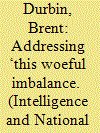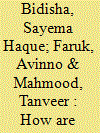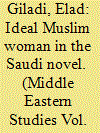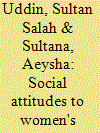|
|
|
Sort Order |
|
|
|
Items / Page
|
|
|
|
|
|
|
| Srl | Item |
| 1 |
ID:
140987


|
|
|
|
|
| Summary/Abstract |
From the wartime Office of Strategic Services to the contemporary Central Intelligence Agency (CIA), women have played a key role in US national intelligence. Yet, aside from episodic attention to the especially colorful lives of individual spies or analysts, few resources have been available to assess the broader status and service of these women. On 30 October 2013, the Central Intelligence Agency released the document collection From Typist to Trailblazer: The Evolving View of Women in the CIA's Workforce, a set of declassified files related to women's employment at the agency. This essay places these documents – which include personnel files, interagency memoranda, and internal CIA surveys and studies – into their broader institutional and social contexts, arguing that, despite the slow pace of change, CIA has made significant progress in addressing sex discrimination within its ranks.
|
|
|
|
|
|
|
|
|
|
|
|
|
|
|
|
| 2 |
ID:
187134


|
|
|
|
|
| Summary/Abstract |
In Bangladesh, despite increased participation in the labour market in recent decades, women are still lagging behind men by a significant margin, with the former being concentrated chiefly in low-paid agriculture as well as in the lower stages of the occupational ladder. With the help of the latest labour market data of 2016–2017 coupled with 2011 census data, this article attempts to examine gender segregation through sectoral and occupational lenses. Our econometric estimation of different sectors (agriculture, manufacturing, construction and service) reflects the importance of gender-centric factors such as care burden and marital status along with local employment opportunities in constraining women’s labour market engagement. Besides, decomposition analysis highlights that unfavourable returns to endowments play a crucial role in females’ concentration in relatively low-productive sectors. Sectoral and occupational segregation indices reflect a high degree of segregation between men and women. Thus, against the backdrop of the concentration of women in low-skilled jobs and a low-productive sector, this article expects to provide important policy insights for boosting female employment in relatively high-productive sectors and high-paid occupations while utilizing the structural shift in the labour market of Bangladesh.
|
|
|
|
|
|
|
|
|
|
|
|
|
|
|
|
| 3 |
ID:
192278


|
|
|
|
|
| Summary/Abstract |
The gender ideology promoted within Saudi political culture constructs a model of the ‘ideal Muslim woman’. This ideal woman is a wife and a mother whose place is in the private sphere, and men are her guardians. Women who remain in their homes, raising the next generation and preserving the traditional values, constitute the quintessential emblem of the unique Saudi national identity. Based on a critical analysis of some 30 Saudi novels written between 1980 and 2000, this study focuses on the changes in the model of the ideal Muslim woman, alongside changes in Saudi attitudes toward women's education and employment. I argue that whereas the regime cultivated the traditional perception of the ideal woman and conservative attitudes toward women's education and employment, the novels presented and constructed hybrid perceptions of these issues, and gradually developed a sharply critical perspective on them.
|
|
|
|
|
|
|
|
|
|
|
|
|
|
|
|
| 4 |
ID:
122431


|
|
|
|
|
|
|
|